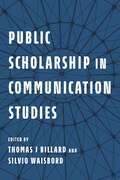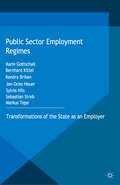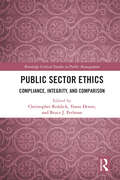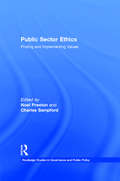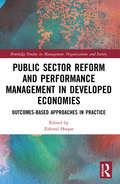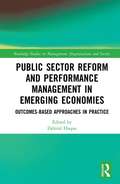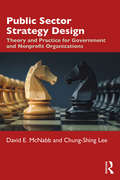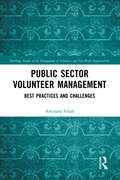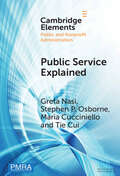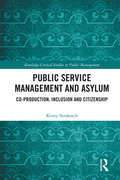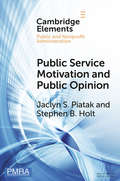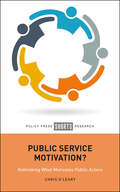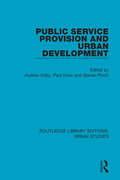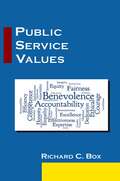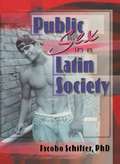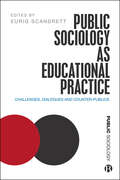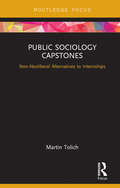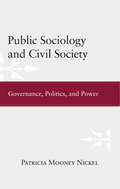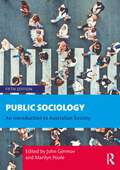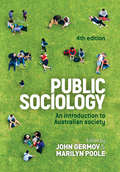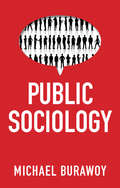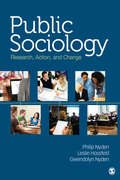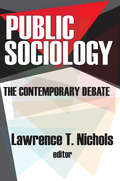- Table View
- List View
Public Scholarship in Communication Studies
by Larry Gross Silvio Waisbord Chad Raphael Sue Robinson Aymar Jean Christian Holley Wilkin Amy Jordan Susan Mancino Daniel Kreiss Srividya Ramasubramanian Paula Gardner Philip M Napoli Thomas J. Billard Rachel Kuo Yidong Wang Elaine Almeida Stacey L Connaughton Shannon C McGregor Danielle K Brown Todd P Newman Becca BeetsPrometheus brought the gift of enlightenment to humanity and suffered for his benevolence. This collection takes on scholars’ Promethean view of themselves as selfless bringers of light and instead offers a new vision of public scholarship as service to society. Thomas J Billard and Silvio Waisbord curate essays from a wide range of specialties within the study of communication. Aimed at scholars and students alike, the contributors use approaches from critical meditations to case studies to how-to guides as they explore the possibilities of seeing shared knowledge not as a gift to be granted but as an imperative urging readers to address the problems of the world. Throughout the volume, the works show that a pivot to ideas of scholarship as public service is already underway in corners of communication studies across the country. Visionary and provocative, Public Scholarship in Communication Studies proposes a needed reconsideration of knowledge and a roadmap to its integration with community. Contributors: Elaine Almeida, Becca Beets, Thomas J Billard, Danielle K. Brown, Aymar Jean Christian, Stacey L. Connaughton, Paula Gardner, Larry Gross, Amy Jordan, Daniel Kreiss, Rachel Kuo, Susan Mancino, Shannon C. McGregor, Philip M. Napoli, Todd P. Newman, Srividya Ramasubramanian, Chad Raphael, Sue Robinson, Silvio Waisbord, Yidong Wang, and Holley Wilkin
Public Sector Employment Regimes: Transformations of the State as an Employer (Transformations of the State)
by Bernhard Kittel Kendra Briken Markus Tepe Karin Gottschall Jan-Ocko Heuer Sylvia Hils Sebastian StrebThis book explores the extent to which a transformation of public employment regimes has taken place in four Western countries, and the factors influencing the pathways of reform. It demonstrates how public employment regimes have unravelled in different domains of public service, contesting the idea that the state remains a 'model' employer.
Public Sector Ethics: Compliance, Integrity, and Comparison (Routledge Critical Studies in Public Management)
by Christopher Reddick Tansu Demir Bruce J. PerlmanPublic Sector Ethics: Compliance, Integrity, and Comparison presents a comprehensive treatment of the subject of ethics in the public sector. What structural elements are necessary and how to create organizations that make ethics their priority are the questions that this edited book addresses. It focuses on ethics management in public organizations and includes national case studies from select low- to middle-income countries.Taken together, the chapters in this book cover the mechanisms, activities, and approaches that public organizations employ in ethics management. These are of utmost importance because the actions of public organizations affect citizens’ lives, liberties, and property, and their ethical character affects citizens’ faith in government. Numerous factors are at play in each instance of ethics management in public organizations, and controlling ethical behavior is difficult. This book suggests that effective ethics management requires a comprehensive approach. Traditional approaches such as ethics codes, policies and legislation, training, incentives, sanctions, monitoring, and compliance reviews are tools to achieve ethical conformity. Yet, they are effective only if leadership, values, and cultural transformation support them. This edited volume is a cohesive treatment of the subject, covering traditional approaches to ethics management, such as monitoring and compliance, and more contemporary approaches, like integrity building through ethical leadership and organizational values, as well as how to skillfully and effectively combine them to change organizational ethical contexts.This book exposes readers to new approaches and emerging issues in public sector ethics, aids in understanding the challenges of creating ethical organizations, and helps to develop a deeper understanding of ethics management in government organizations. It will be of interest to researchers, academics, and advanced students in the fields of business ethics, public administration and management, leadership, and organizational studies.
Public Sector Ethics: Finding and Implementing Values (Routledge Studies in Governance and Public Policy #Vol. 1)
by Charles Sampford Noel Preston C-A BoisThis study, with contributions from both scholars and practitioners, examines the theory and practice of public sector ethics across a broad range of environments.
Public Sector Reform and Performance Management in Developed Economies: Outcomes-Based Approaches in Practice (Routledge Studies in Management, Organizations and Society)
by Zahirul HoqueOver the past two decades, there has been a shift of paradigm in public administration and public sector accounting around the world with the increasing emphasis on outcomes as opposed to inputs and outputs focus. Understanding of how government departments and agencies develop and implement outcomes-based approaches to their services and programs to strengthen public accountability, financial scrutiny and good governance worldwide is limited. Covering a selection of international practices on outcomes-based approaches to government departments, agencies and public higher educational institutions in developed economies, this comprehensive compilation provides an essential reading in the public sector accounting, accountability and performance management field. The contributions are grouped into three jurisdictions: Australasia, UK and Europe, and North America. It incorporates outcomes-based practices in public services from advanced economies and will be of significant interest to global public sector regulators, consultants, researchers, and academic communities as well as academic researchers in public administration and development studies fields. The insights offered by a country-specific practice will also be useful to governments in other countries implementing similar systems and practices and facing similar socio-political environments. This book will also help to gain an understanding of the issues of government accountability from a management point of view as well as from a socio-political point of view.
Public Sector Reform and Performance Management in Emerging Economies: Outcomes-Based Approaches in Practice (Routledge Studies in Management, Organizations and Society)
by Zahirul HoqueIn the recent decade, governments worldwide are increasingly focusing on being community-centric and outcomes-based. Consequently, they are starting to move towards outcomes-based approaches to public financial management systems. An outcomes-based approach allows government service agencies and specific program areas to organize and communicate priorities to achieve what matters and makes a difference rather than just going through the motions. Empirical evidence on how government agencies in emerging economies go about this contemporary approach and issues affecting these practices is limited. This edited collection of chapters is aimed at covering public sector reform and performance management in emerging economies with special reference to outcomes-based approaches in practice in government services. Practices from developed economies contained in the first book on the topic have been published by Routledge in February 2021. The insights offered on the topic are written by renowned scholars who have identified important issues pertinent to those interested in public sector governance, accounting, accountability, and performance management effectiveness in emerging economies. The book will be highly accessible to researchers, academics, and students in the fields of accounting, public administration, development studies, and other non-accounting audiences alike.
Public Sector Strategy Design: Theory and Practice for Government and Nonprofit Organizations
by David E. McNabb Chung-Shing LeeWithin the public sector, strategies are not designed to influence markets, but instead to guide operations within a complex environment of multilateral power, influence, bargaining, and voting. In this book, authors David McNabb and Chung-Shingh Lee examine five frameworks public sector organization managers have followed when designing public sector strategies. Its purpose is to serve as a guide for managers and administrators of large and small public organizations and agencies. This book is the product of a combined more than sixty years of researching, teaching and leading organizational seminars on the theory and practice of management applications in industrial, commercial, nonprofit and public sector organizations. The book consists of four parts: Strategic Management and Strategy Fundamentals; Frameworks for Designing Strategies; Examples of Public Sector Strategies; and Implementing Strategic Management. Throughout, the focus is on the widespread value of strategic management and adopting the strategy appropriate for the organization. Including chapters on game theory, competitive forces, resources-based view, dynamic capabilities, and network governance, the authors demonstrate ways that real managers of public sector and civil society organizations have put strategic management to work in their organizations. This book will be of interest to both practicing and aspiring public servants.
Public Sector Volunteer Management: Best Practices and Challenges (Routledge Studies in the Management of Voluntary and Non-Profit Organizations)
by Aminata SillahIn order to effectively and consistently provide services to citizens, local governments have had to come up with creative ways for offering services demanded by their citizens. One popular approach became the creation of volunteer programs as local governments became increasingly reliant on volunteers. Volunteers are one means by which local governments help to increase meaningful engagement with citizens and help meet the increasing needs for public services with limited resources. On a broader scale, volunteers in public agencies provide a variety of services to fill gaps in creating and sustaining collective societal goods that otherwise might have been limited due to fiscal stress on local governments or eliminated. Public Sector Volunteer Management: Best Practices and Challenges adds to the understanding of how management practices may affect retention of volunteers. It provides an opportunity to add much-needed data to any discussion concerning volunteering at the local government level from the perspective of volunteer coordinators and aims to provide in-depth research on local government volunteer management practices. This book focuses on best practices identified as necessary for successful volunteer management in the public sector, specifically in a local government setting, making it a valuable text for researchers, academics, and students in the fields of public and non-profit management, leadership, and human resource management.
Public Security in Federal Polities
by Christian Leuprecht Mario Kölling Todd HataleyPublic Security in Federal Polities is the first systematic and methodical study to bring together the fields of security studies and comparative federalism. The volume explores the symbiotic relationship between public security concerns and institutional design, public administration, and public policy across nine federal country case studies: Brazil, Canada, Germany, India, Mexico, South Africa, Spain, Switzerland, and the United States. In addressing specific national security concerns and aspects of globalization that are challenging conventional approaches to global, international, regional, and domestic security, this volume examines how the constitutional and institutional framework of a society affects the effectiveness and efficiency of public security arrangements. Public Security in Federal Polities identifies differences and similarities, highlights best practices, and draws out lessons for both particular federations, and for federal systems in general. This book is essential reading for scholars, students, practitioners as well as policy- and decision-makers of security and federalism.
Public Service Explained: The Role of Citizens in Value Creation (Elements in Public and Nonprofit Administration)
by Greta Nasi Stephen Osborne Maria Cucciniello Tie CuiThis Cambridge Element aims to advance theory by investigating the nature of participation in public service delivery. It situates itself under the theory of Public Service Logic to advocate for a strategic orientation to participation as an element of value creation in public services. It introduces the concept of participation and discusses the motives, incentives, and tools to engage citizens in public service delivery processes. Then, it frames citizens' participation under the approach public service ecosystem to capture the dynamic relationships among citizens, other actors, processes, and structures that may contribute to determining value in public service delivery. It presents the dynamics of value creation and destruction in public service. The Element concludes with implications for research and practice. This title is also available as Open Access on Cambridge Core.
Public Service Management and Asylum: Co-production, Inclusion and Citizenship (Routledge Critical Studies in Public Management)
by Kirsty StrokoschCo-production occurs when citizens actively participate in the design and delivery of public services. The concept and its practice are of increasing interest among policymakers, public service managers and academics alike, with co-production often being described as a revolutionary solution to public service reform. Public Service Management and Asylum: Co-production, Inclusion and Citizenship offers a comprehensive exploration of co-production from the public administration and service management perspectives. In doing so, it discusses the importance of both streams of literature in providing a holistic understanding of the concept, and based on this integration, it offers a model which differentiates co-production on five levels. The first three refer to the role of the public service user in the design and delivery of services (co-construction, participative co-production and co-design) and the other two focus on inter-organisational relationships (co-management and co-governance). This model is applied to the case of asylum seekers in receipt of social welfare benefits in Scotland to explore the implications for social inclusion and citizenship. It argues that as public service users, asylum seekers will always play an active role in the process of service production and while co-production does not provide asylum seekers with legal citizenship status, if offers an opportunity for asylum seekers to act like citizens and supports their inclusion into society. It will be of interest to researchers, academics, policymakers, public services managers, and students in the fields of public management, public administration, organizational studies.
Public Service Motivation and Public Opinion: Examining Antecedents and Attitudes (Elements in Public and Nonprofit Administration)
by Jaclyn S. Piatak Stephen B. HoltPractitioners, policymakers, and scholars across fields and disciplines seek to understand factors that shape public opinion and public service values, especially in today's polarized context. Yet we know little about how the two relate. Research on public service motivation (PSM), a drive to help others grounded in public institutions, has grown to examine career decisions and behaviors within and outside the workplace, but does the influence of PSM extend to individual values? Using data from the Cooperative Congressional Election Study surrounding the 2016 US presidential election, we first examine the antecedents of PSM; how do individual characteristics as well as socioeconomic and sociocultural factors influence levels of PSM? Second, we describe the role PSM plays in shaping public opinion on policy preferences, budget priorities, and political behaviors. Findings have implications for both understanding who has PSM as well as how PSM shapes public preferences, attitudes, and behaviors.
Public Service Motivation?: Rethinking What Motivates Public Actors
by Chris O'LearyChris O’Leary looks afresh at the reasons for prosocial work choices in the first substantive critique of Public Service Motivation (PSM). With critical analysis of theoretical and empirical research to date, this book explores the pros and cons of PSM and interrogates the reasons why people choose to work in the public and third sectors. It proposes an alternative theory for the pursuit of service, rooted in rational choice theory, that shows public servants are expressly motivated to confirm their values and identity through their work. For those involved in public policy, administration and management, this is a constructive and stimulating review of an important but often neglected aspect of the sector.
Public Service Provision and Urban Development (Routledge Library Editions: Urban Studies #14)
by Paul Knox Steven Pinch Andrew KirbyOriginally published in 1984. The authors of this study address a number of major themes related to the analysis of public services: the role of public choice theory, the importance of professors and organisations, the value of neo-Marxist theories and the importance of space. These issues are considered in the context of case studies of school closures, the provision of medical care, the relationships between Federal outlays and presidential politics, the provision of nurseries, demand-making in local government and the fiscal crisis facing many American cities. The subject of public service provision is of great interest not only to political scientists but also to geographers and to sociologists. This book presents a great deal of new thinking and new research from both North America and Britain.
Public Service Values
by Richard C. BoxPublic service values are too rarely discussed in public administration courses and scholarship, despite recent research demonstrating the importance of these values in the daily decision making processes of public service professionals. A discussion of these very tenets and their relevance to core public functions, as well as which areas might elicit value conflicts for public professionals, is central to any comprehensive understanding of budget and finance, human resource management, and strategic planning in the public sector. Public Service Values is written specifically for graduate and undergraduate courses in public administration, wherever a discussion of public service ideals might enrich the learning experience and offer students a better understanding of daily practice. Exploring the meaning and application of specific values, such as Neutrality, Efficiency, Accountability, Public Service, and Public Interest, provides students and future professionals with a ‘workplace toolkit’ for the ethical delivery of public services. Well-grounded in scholarly literature and with a relentless focus on the public service professional, Public Service Values highlights the importance of values in professional life and encourages a more self-aware and reflective public practice. Case studies to stimulate reflection are interwoven throughout the book and application to practice is cemented in a final section devoted to value themes in professional life as well as a chapter dedicated to holding oneself accountable. The result is a book that challenges us to embrace the necessity of public service values in our public affairs curricula and that asks the important questions current public service professionals should make a habit of routinely applying in their daily decision making.
Public Services in EU Law
by Wolf SauterIn the EU public services, utilities and welfare services can be seen as both building blocks for the internal market and as a persistent irritant in the integration process. This book provides a comprehensive overview of the EU law on public services within the context of European integration. It brings together important analysis of the primary Treaty law, mainly on the internal market and competition, and of the secondary legislation at EU level, including different sector specific regimes. Particular attention is given to case law of the EU courts. This will be essential reading for those looking to have a broader understanding of the subject.
Public Sex in a Latin Society
by Jacobo SchifterExplore the risks and rewards of seeking and having sex in public places!Public Sex in a Latin Society is one of the first books to explore the lives of people who look for sex in public places and the dangers involved--from murder to HIV infection. The book examines why many gay men have been murdered by sex workers who frequent public sex places, such as the parks, bathhouses, or saunas, and suggests some basic safety rules. Containing interviews with police officials, murderers, and sex workers, Public Sex in a Latin Society explores the motivations for seeking public sex, why gay men who have sex in public are sometimes murdered, and how these killings could be prevented. This eye-opening book contains studies that examine mechanisms for assault and crime and examines data on the roles that sexual and physical abuse play in sex workers and their clients. Public Sex in a Latin Society explores Latin society's Catholic church-influenced negative view of homosexuality, explaining why gay men are seen as the equivalent of murderers and thieves, why the topic is censored in the media, and why client murders are rarely investigated.Public Sex in a Latin Society discusses the dangers facing public sex seekers and suggests guidelines, such as: refrain from flaunting wealth or wearing fine jewelry or clothes when looking for public sex to decrease the chances of getting mugged or physically assaulted never try to negotiate changes to the agreement or method of payment after sex--this can bring on physical harm or even death do not make advances or ask for sexual acts that were not agreed upon and be especially careful about everything relating to anal sex never take drugs or drink alcohol while seeking sex in order to be alert if you are attackedPublic Sex in a Latin Society provides you with a shocking analysis of how public sex in Latin America has become part of the Latin economy without advancing sexual liberation or social equality. This provocative and intelligent book will give you a better understanding of Latin American sexual culture.
Public Sociology As Educational Practice: Challenges, Dialogues and Counter-Publics (Public Sociology)
by Eurig ScandrettLeading academics take a distinctive new approach to the understanding of public sociology education in this perceptive new resource. Through pedagogical case studies and inter-contributor dialogues, they develop and challenge thinking in the field. Divided into three sections on the publics, knowledges and practices of public sociology education, it looks beyond the boundaries of academia to deliver fresh responses to key disciplinary questions including the purposes and targets of sociological knowledge. For students, academics and practitioners, it is a timely and thought-provoking contribution to debate about public sociology education.
Public Sociology Capstones: Non-Neoliberal Alternatives to Internships
by Martin TolichSocial science departments, both nationally and internationally, market boundless career destinations for their graduates but fail to identify the pathways to these lucrative destinations, and appear oblivious to the social forces that threaten their existence, such as the discerning parent’s investment in their offspring’s education and mounting individual student debt. This book responds to these social forces, drawing on Michael Burawoy’s model of Public Sociology to show how a research-centred experiential internship provides opportunities for students to draw on their prior learning and realise their potential to create pathways towards employment. The author demonstrates how a specific, research-based course leading to employment with a non-government organisation or government department was evaluated and incrementally developed, giving voice to its multiple beneficiaries. Designed for university teachers, this book will appeal to those in social science departments who are using an internship, service learning or capstone model for their senior undergraduate classes.
Public Sociology and Civil Society: Governance, Politics, and Power
by Patricia Mooney NickelDuring the past ten years the terms public sociology, civil society, and governance have been used with increasing frequency to describe a wide array of political and social practices. Nickel provides a critical clarification of the concepts of civil society and governance, moving beyond traditional disciplinary boundaries. With her unique international background in the practice of public service and social policy Nickel is able to provide a nuanced explanation of how civil society and governance are interrelated and the implications for the organisation of knowledge and public life. The book is framed in three parts. Part one explores the emergence of public sociology as an ideal, as well as the broader public turn in the social sciences. Part two explores the changing relationship between government and civil society, including non-profit organisations. Part three draws these two themes together in an exploration of the politics of practice and relations of power.
Public Sociology: An Introduction to Australian Society
by John Germov Marilyn PoolePublic Sociology highlights the relevance of sociological perspectives to Australian social life and encourages students to apply a sociological gaze to their own lives and the communities in which they live. This fully revised and updated fifth edition adds new chapters and material on a wide range of contemporary issues, from the COVID-19 pandemic and ‘fake news’ to Iindigenous issues and the Black Lives Matter (BLM) movement. Public Sociology presents a wide range of topics in a user-friendly and accessible way, introducing key theories and research methods, and exploring core themes, including youth, families and intimate relationships, class and inequality, and race and ethnic relations. All chapters have been extensively revised to bring them up to date in a fast-changing social world, reflecting the latest sociological debates in response to changing lifestyles and evolving political landscapes. In addition to updated statistics and research findings, an expanded glossary and the latest citations to the scholarly literature, each chapter includes numerous learning features for students and instructors, including definitions of key terms, concise summaries of main points, discussion questions and guides to further reading and additional resources. This is the essential sociological reference to help students in the social sciences make sense of a complex and challenging world. New to the Fifth Edition: New chapters on the COVID-19 pandemic, Indigenous issues, youth and identity, and sport Exploration of the latest social issues including the pandemic, BLM, expanded discussion of gender, #MeToo, LGBTIQ+ and intersectionality, rising inequality and the ‘post-truth’ age All chapters thoroughly revised and updated with the latest research Updated design, images, and chapter opening vignettes to engage the reader
Public Sociology: An introduction to Australian society
by John Germov Marilyn PooleFrom the future of work to the nature of our closest relationships, how do we understand the links between our personal troubles and wider public issues in society today?Now into its fourth edition, Public Sociology continues to highlight the relevance of a grounded sociological perspective to Australian social life, as well as encouraging students to apply a sociological gaze to their own lives and the communities in which they live.Public Sociology presents a wide range of topics in a user-friendly and accessible way, introducing key theories and research methods, and exploring core themes, including youth, families and intimate relationships, class and inequality and race and ethnic relations. All chapters have been extensively revised to bring them up to date in a fast-changing social world, reflecting the latest sociological debates in response to changing lifestyles and evolving political landscapes. In addition to updated statistics and research findings, an expanded glossary and the latest citations to the scholarly literature, the text features a completely new chapter on gender and sexualities with expanded discussion of LGBTIQ+. This new edition also explores contemporary issues ranging from the #MeToo movement to marriage equality, fake news and 'alt facts'.This is the essential sociological reference to help students make sense of a complex and challenging world.NEW TO THE FOURTH EDITION:* A new chapter on gender and sexualities and expanded discussion of intersectionality * Exploration of the latest social issues including #MeToo, rising inequality, and the 'post-truth' age* All chapters thoroughly revised and updated with the latest research* Updated book website with extra readings, YouTube clips, and case studies* A new feature, Visual Sociology, helps the reader analyse the power of visual messaging'With a firm base in the richest traditions of the discipline and with a remarkably approachable format, this book offers an excellent introduction to a wide array of sociology's concerns, making it suitable for all Australian social science undergraduates.'Gary Wickham, Emeritus Professor of Sociology, Murdoch University'A sophisticated yet accessible introduction to social identities, differences and inequalities, and social transformations.'Jo Lindsay, Professor in Sociology, Monash University'Sweeping and lucid...communicates with ease and simplicity.'Toni Makkai, Emeritus Professor, College of Arts and Social Sciences, Australian National University
Public Sociology: Ethics And Engagement
by Michael BurawoyMichael Burawoy has helped to reshape the theory and practice of sociology across the Western world. Public Sociology is his most thoroughgoing attempt to explore what a truly committed, engaged sociology should look like in the twenty-first century. Burawoy looks back on the defining moments of his intellectual journey, exploring his pivotal early experiences as a researcher, such as his fieldwork in a Zambian copper mine and a Chicago factory. He recounts his time as a graduate and professor during the ideological ferment in sociology departments of the 1970s, and explores how his experiences intersected with a changing political and intellectual world up to the present. Recalling Max Weber, Burawoy argues that sociology is much more than just a discipline – it is a vocation, to be practiced everywhere and by everyone.
Public Sociology: Research, Action, and Change
by Dr Philip W. Nyden Dr Leslie H. Hossfeld Gwendolyn NydenThis timely resource, written by a team of authors who are working at the forefront of the public sociology movement, provides a contemporary analysis of public sociology. The book highlights a variety of ways in which sociology brings about social change in community settings, assists nonprofit and social service organizations in their work, and influences policy at the local, regional, and national levels. The book also spotlights sociology that informs the general public on key policy issues through media and creates research centers that develop and carry out collaborative research.
Public Sociology: The Contemporary Debate
by Lawrence T. NicholsPublic Sociology features a wide-ranging discussion of the controversial model of a social science that reaches out to non-academic audiences, including both average citizens and policymakers. This approach has been greeted with enthusiasm by supporters, and with skepticism and anxiety among critics. Both perspectives are well represented in this volume.Some of the critical voices question whether public sociology is even a good idea. Others dissent, arguing for a strong program in professional sociology as an alternative. Still others express concern that public sociology promotes a liberal-left political agenda, despite its nonpartisan pretensions. Some elements of the model are queried, such as ""critical sociology."" Others are supportive--discussing personal experiences, the benefits of an engaged social science, and how it could take social science into a broader, global marketplace.Following an introduction by the editor, the contributions include: David Boyns and Jesse Fletcher, ""Public Relations, Disciplinary Identity, and the Strong Program in Professional Sociology,"" Jonathan H. Turner, ""Is Public Sociology Such a Good Idea?"" Steven Brint, ""Guide to the Perplexed,"" Vincent Jeffries, ""Piritim A. Sorokin's Integralism and Public Sociology,"" Norella M. Putney, Dawn E. Alley, and Vern L. Bengston, ""Social Gerontology as Public Sociology in Action,"" Edna Bonacich, ""Working with the Labor Movement: A Personal Journey in Organic Public Sociology,"" Christopher Chase-Dunn, ""Globabl Public Social Science,"" Neil McLauglin, Lisa Kowalchuk, and Kerry Turcotte, ""Why Sociology Does Not Need to be Saved,"" Michael Burawoy, ""Third-Wave Sociology and the End of Pure Science,"" Patricia Madoo Lengerman and Jill Niebrugge-Brantley, ""Back to the Future: Settlement Sociology, 1885i?1/2-1930,"" Sean McMahon, ""From the Platform: Public Sociology in the Speeches of Edward A. Ross,"" Chet Ballard, ""The Origin and Early History of the Association for Humanist So
